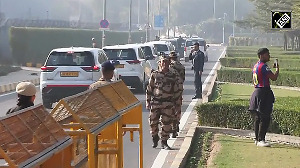Pakistan's dreaded spy agency Inter Services Intelligence no longer works under a cloak of secrecy. It is slowly opening up -- even to foreign media.
A report in Guardian says the ISI is coming in from the cold. The report says, "Over the past year, the agency has invited a stream of western journalists into its swish, modern nerve centre in Islamabad. Over tea and PowerPoint briefings, spies give details of some of Pakistan's most sensitive issues the Taliban insurgency, the hunt for al-Qaida, the troubled relationship with India."
The Guardian report quoted an ISI spokesperson as saying that the opening up is a deliberate poly to rehabilitate the image.
"We started to open up a little," said an ISI official authorised to speak to the press.
"In the past, irrespective of whether we did something, we were getting blamed for it. Now we want to reach out and get our point of view across."
The report says influencing the local press has always been part of ISI operations, usually through bribes, blandishments or intimidation. But it rarely reached out to the foreign press, until now.
But interestingly, it is opening up to foreign media now what was a strict no-no in the past.
"This is totally unprecedented," said Stephen Cohen, a Pakistan expert at the Brookings Institution policy research organisation in Washington.
"It seems to be part of a new openness in the military. They're worried about caricatures of Pakistan, especially in the foreign press, such as people saying the country is going to break up in three months."
The report says the briefings, which take place about once a week, belie the agency's gritty image. Reporters are shepherded into a wood-panelled conference room with soft armchairs, a long table and a wall-mounted screen.
Officials in business suits, who could pass for middle management in any company, introduce themselves without full name or job title.
The report says the bolder media policy is part of a wider global trend. The CIA and MI6 have always maintained relationships with selected journalists, an engagement whose importance has increased amid the furore over torture and abduction allegations.
The report says, "Still, the old cliches about the spy collective being a "state within a state" or a "rogue agency" are out of date. These days it is said to be firmly in the grip of the army chief, General Ashfaq Kayani, who previously ran the agency for three years."





